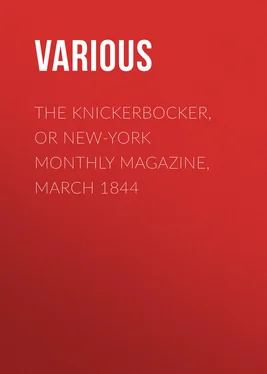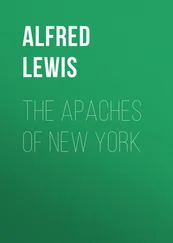Various - The Knickerbocker, or New-York Monthly Magazine, March 1844
Здесь есть возможность читать онлайн «Various - The Knickerbocker, or New-York Monthly Magazine, March 1844» — ознакомительный отрывок электронной книги совершенно бесплатно, а после прочтения отрывка купить полную версию. В некоторых случаях можно слушать аудио, скачать через торрент в формате fb2 и присутствует краткое содержание. Жанр: foreign_antique, periodic, foreign_edu, на английском языке. Описание произведения, (предисловие) а так же отзывы посетителей доступны на портале библиотеки ЛибКат.
- Название:The Knickerbocker, or New-York Monthly Magazine, March 1844
- Автор:
- Жанр:
- Год:неизвестен
- ISBN:нет данных
- Рейтинг книги:5 / 5. Голосов: 1
-
Избранное:Добавить в избранное
- Отзывы:
-
Ваша оценка:
- 100
- 1
- 2
- 3
- 4
- 5
The Knickerbocker, or New-York Monthly Magazine, March 1844: краткое содержание, описание и аннотация
Предлагаем к чтению аннотацию, описание, краткое содержание или предисловие (зависит от того, что написал сам автор книги «The Knickerbocker, or New-York Monthly Magazine, March 1844»). Если вы не нашли необходимую информацию о книге — напишите в комментариях, мы постараемся отыскать её.
The Knickerbocker, or New-York Monthly Magazine, March 1844 — читать онлайн ознакомительный отрывок
Ниже представлен текст книги, разбитый по страницам. Система сохранения места последней прочитанной страницы, позволяет с удобством читать онлайн бесплатно книгу «The Knickerbocker, or New-York Monthly Magazine, March 1844», без необходимости каждый раз заново искать на чём Вы остановились. Поставьте закладку, и сможете в любой момент перейти на страницу, на которой закончили чтение.
Интервал:
Закладка:
‘Believe it or not, as you will; I tell you it is necessary.’
‘But I tell you, Doctor, that my child is a part of myself, my own flesh and blood; and can you counsel me to become an apostate to my own principles? It has been my dearest thought that I should one day enjoy in my own seclusion the reflected lustre of my child’s brilliant position in the world, and that that position should be by the side of one whose course in life my own ripe judgment approves entirely. A man of Mr. Lillburgh’s principles cannot make her happy; I will not believe that he can. No, I have always cared for my daughter’s happiness; I will care for it still, by settling this matter for her as I best know how. No; again I say no; my only child shall not be so sacrificed!’ And Mr. Lee stamped on the floor, as if to add force to his speech.
‘When you are cool,’ said Dr. Kent, looking any thing but cool himself, ‘I will remind you of your promise, your positive promise; there is Mr. Lillburgh now approaching the house; ask both your heart and conscience how he ought to be received. Good morning to you.’
Without stopping to consult either of these counsellors, Mr. Lee hastily rang the bell. ‘We are both engaged, and cannot see the gentleman who is now coming to the door,’ said he to the servant. The doorbell was heard at the instant, and the servant hastened to obey his master’s directions.
The doctor was gone. Mr. Lee, pacing the parlor alone, imagined to himself all sorts of arguments to satisfy his conscience that he was in the right. Yet, thought he, my little darling must be made happy; all young girls love trinkets and finery; I will take her out with me this morning, and she shall indulge every caprice of her pretty fancy; pretty in every thing else but fixing itself on that Mr. Lillburgh. ‘Pshaw! he shall not have her; call Miss here,’ he continued to a servant who entered at the moment. The servant returned after a few minutes, saying that he had knocked repeatedly at her door, but received no answer. Vaguely apprehensive of something wrong, Mr. Lee hastened himself to her chamber; but how was he shocked on entering, to find his daughter lying senseless in a swoon near an open window. Ah! what voice whispered him that she had seen and heard at that window what her delicate nerves could not endure! He raised her tenderly in his arms, and having with some difficulty restored her to consciousness, placed her on the bed. ‘Good heavens!’ thought he, ‘can it be indeed so serious!’ But he could not long speculate upon this subject; Lucy’s cheek, but just now so pale and marble-like, soon began to glow with fever; her pulse, but just restored to action, now told with momently increasing hurry that illness had seized the delicate frame; the sudden revulsion from new-born hope to despair had been too much for it. Poor Mr. Lee! what did his heart say now? Did it yet upbraid him? Dr. Kent, who had set out on a course of visits, could not at once be found, and the wretched father sat gazing in agonizing helplessness on his suffering child until the decline of the day. What would he have given to live over again the last few hours! At length the physician appeared: ‘Now,’ said he, on accosting Mr. Lee, ‘do you think I know my own business or not? Do I make mountains of mole-hills or not? I knew what I was about, didn’t I?’
‘Alas, yes!’ replied the other, in a self-accusing tone, ‘and I did not; but oh! merciful Providence! is it too late now?’
‘Too late? Heaven knows, poor young lady! she’d have been better off if she’d been an ugly twelfth daughter, with no one to trouble themselves much about her, instead of a beautiful darling, that must have one particular sort of happiness and no other.’
‘Spare me! spare me, my friend!’ implored Mr. Lee.
‘I wish you had spared yourself,’ grumbled Dr. Kent.
The Doctor was, it must be allowed, a little rough; but he had been so thoroughly annoyed, after having, as he thought, with unparalleled cunning and discretion detected the difficulty and provided a remedy, to find his plans thwarted by an obstinate wilfulness, that he could not help boiling over a little: his kind feelings however soon got the ascendency; the deep contrition of the poor father touched his heart, and the lovely girl who had only increased his interest in her by making good his words, received from him the most attentive care; nor could he doubt that at length his advice was appreciated, when he heard Mr. Lee take every opportunity of mentioning Mr. Lillburgh’s name with approbation and kindness, always regretting that he had made such a mistake as to send him away the last time he had called at the house.
But who may venture to choose their own time for showing kindness? Who may, having refused to ‘do good when it was in the power of his hand to do it,’ resume at will the precious privilege? Dr. Kent, satisfied with his friend’s repentance, was willing to take any step which might avail to retrieve the mischief; but when this last would have lured back by civilities the repulsed lover, he was found to have left home the very day after his mortifying dismissal.
Let those who only by looking back can see the road by which misery might have been escaped, while before the vista seems quite closed up, conceive the deep and agonizing perplexity of the anxious father. His daughter, comforted no doubt by his frequent recurrence to the subject near her heart, and the manner in which he treated it, slowly raised her drooping head; but he, (the entire amende being still out of his power) hung over her night and day, oppressed by a constant sensation of guilt, scarcely aware of her partial restoration. For some days this ordeal lasted; there seemed a risk that the lover might in the bitterness of his disappointment prolong his stay indefinitely; what availed it then that the prejudice and ambition which had exiled him were now annihilated? The eagerly coveted-prize for which he would have sacrificed his daughter’s peace, had turned to ashes in his grasp.
But the door to returning happiness was not completely closed. Dr. Kent’s skill, aided no doubt by Lucy’s young confidence in her lover’s steadfastness, kept danger at bay, until one of those opportune accidents of life, which like many of the best things in it look threateningly until time takes off the veil, occurred in the shape of a fire on the premises of the wanderer; which news, forcing him to return, the indefatigable Dr. Kent at once offered to divert his mind from this untoward circumstance, by taking him to join the family dinner of his friend Mr. Lee. The sequel may be imagined; on the strength of this friendly invitation, aided no doubt by sundry blushes and smiles on Lucy’s part, Mr. Lillburgh ventured to resume his visits, and Lucy’s cheek always looked so particularly rosy on such occasions, that Mr. Lee soon became too entirely happy in the result, to cavil any longer at the cause of her renovated health and spirits. Sometimes, also, memory would recall for an instant that terrible period of anxiety, and then he would treat Mr. Lillburgh with such pointed cordiality, that before very long that young gentleman was emboldened to take advantage of his civility, and make some disclosure of his own plans for the fair Lucy’s happiness, according to the liberty of speech young gentlemen generally allow themselves when desirous of securing their own. Mr. Lee had gone too far to recede, and he soon found himself reduced to the necessity of resting all his hopes for the gratification of his favorite fancies and prejudices upon the anticipated course through life of another generation, whose future being happily so distant, promised him a long period of hope.
THE FRATRICIDE’S DEATH
Интервал:
Закладка:
Похожие книги на «The Knickerbocker, or New-York Monthly Magazine, March 1844»
Представляем Вашему вниманию похожие книги на «The Knickerbocker, or New-York Monthly Magazine, March 1844» списком для выбора. Мы отобрали схожую по названию и смыслу литературу в надежде предоставить читателям больше вариантов отыскать новые, интересные, ещё непрочитанные произведения.
Обсуждение, отзывы о книге «The Knickerbocker, or New-York Monthly Magazine, March 1844» и просто собственные мнения читателей. Оставьте ваши комментарии, напишите, что Вы думаете о произведении, его смысле или главных героях. Укажите что конкретно понравилось, а что нет, и почему Вы так считаете.












